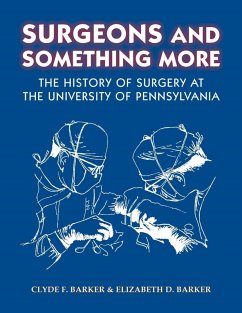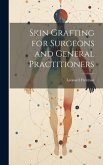Biographical sketches of the nineteen chairmen who have guided the evolution of the University of Pennsylvania's medical school and surgery department, America's first, from 1765 to the present day In Surgeons and Something More, Clyde F. and Elizabeth D. Barker chronicle the evolution of the University of Pennsylvania's medical school and surgery department, America's first, begun in 1765. In the turbulent times before and after the Revolution, with medicine and surgery then in a primitive state, the new school's leaders included some of America's most conspicuous political and military figures.Over the next 250 years, the new nation experienced a dozen wars, four presidential assassinations, several devastating epidemics, and the expansion of US territory nine times over. This book reveals how Penn surgeons played prominent roles in these events as well as in the concomitant medical advances, such as anesthesia, antisepsis, heart surgery, x-rays, transplantation, cancer chemotherapy, intravenous nutrition, and gene therapy. Biographical sketches of the nineteen chairmen who have guided Penn Surgery over its development detail the department's progress and depict some of its setbacks. These trailblazers wrote the first text- books, taught the first classes, started the field's journals, and led its academic organizations. By inventing new procedures, they saved countless lives. But by ignoring antisepsis, they lost many others. They operated on paupers, prisoners, Supreme Court justices, and gravely wounded presidents. Three of them became US Surgeon Generals. Others fought duels, explored the frozen Arctic seas, and conducted clandestine love affairs. In war, they parachuted behind enemy lines and invented SCUBA to disrupt enemy shipping. They built World War II's largest hospital in the Burmese jungle to care for wounded commandos, and in Korea's MASH tents they were the real-life Hawkeyes struggling to save the lives of stricken GIs. This is the story of how surgery evolved to its present, still imperfect, form, and of the role played by the doctors of the University of Pennsylvania in advancing the surgeon's science and art.
Hinweis: Dieser Artikel kann nur an eine deutsche Lieferadresse ausgeliefert werden.
Hinweis: Dieser Artikel kann nur an eine deutsche Lieferadresse ausgeliefert werden.








